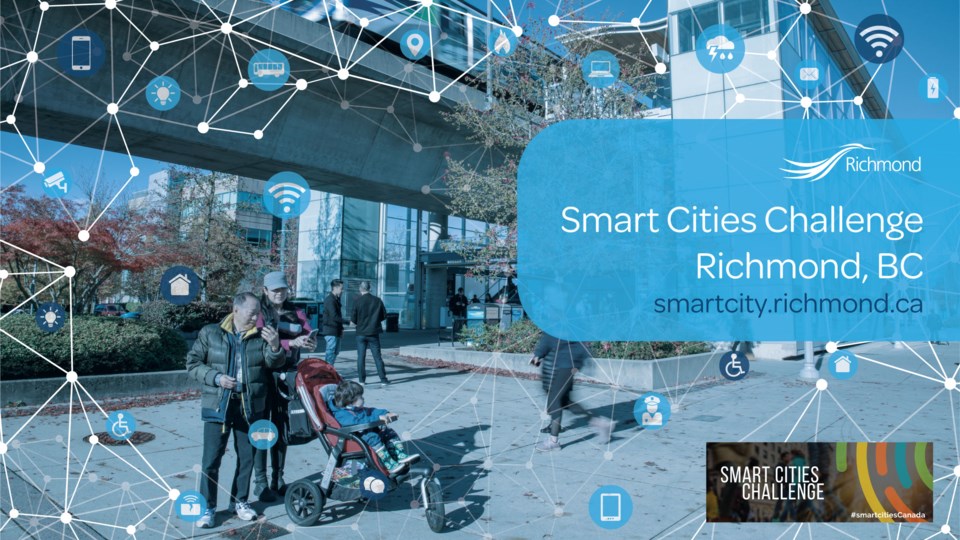It’s morning. The alarm’s gone off and you reach for your phone – scrolling through notifications, reading messages, checking the news. An alert pops up to tell you about traffic delays, bill payment deadlines and weather alerts. All the information you need to start your day is at your fingertips, on one device.
This connectivity is at the heart of Richmond’s Smart Cities vision, where the city is vying for one of two $10 million prizes to use data and technology to improve residents’ lives. Richmond is one of 10 finalists in its category, and now, the city is looking for feedback from the public on its project proposal.
“As part of the Canada-wide Smart Cities competition, we are identifying ways to enhance the daily lives of residents through innovation, data and connected technology,” said Mayor Malcolm Brodie.
“Of most importance will be the creation of a successful model to integrate all levels of government, while we encourage partnerships across the private sector and academia to foster improved community resilience during major emergencies.”
In its Smart Cities vision, the city has proposed to create an “Intelligent Operation Hub” that will integrate data and coordinate emergency responses in the event of a major emergency, or even in the case of smaller day to day events such as traffic congestion.
“Around the world there’s literally billions of different devices that are connected to the internet and are producing different types of data. All that data potentially is valuable information, particularly to a local government in terms of how we manage the city,” Ted Townsend, city spokesperson and a co-lead of the City’s Smart Cities Project Team, told the Richmond News.
“The challenge is, many of those devices don’t speak to each other. They’re not interconnected.”
Townsend explained the city has worked to link its own data sources through the My Richmond platform.
“In the past, while all our services were available online, they each required a separate password, a separate user ID,” he said, adding that now all city services are available through a single login.
“We’re going to continue to expand (My Richmond) and add more online services…and make it more accessible. So Smart Cities just allows us to accelerate that process.”
One area of focus will be to “push” real-time notifications out residents who want them about day-to-day occurrences, such as traffic and rerouting. Then, in the event of an emergency such as an earthquake, the system to send out important information will already be set up.
“During an emergency we can actually push some of the messaging out,” said Denise Tambellini, manager, intergovernmental relations and a co-lead of the City’s Smart Cities Project Team.
“This is not about creating an emergency plan. This is about ensuring we have the appropriate technology to make what we do more effective.”
Another area of focus for Richmond’s Smart Cities is language barriers, particularly as only 33 per cent of residents in the city identify English as their mother tongue.
“Language barriers is a big challenge we face in community services and face-to-face communication is primarily what we use to overcome that,” Townsend explained, adding that My Richmond currently only operates in English.
“we want to look at technology to see if there’s better ways that can help us address some of those barriers.”
Richmond’s Smart Cities proposal is part of the Minister of Infrastructure and Communities’ nationwide challenge “to develop bold and ambitious ideas to improve the lives of their residents using data and connected technology.”
After receiving more than 200 applications, the federal government announced its finalists in the spring. As a finalist, Richmond is now competing against nine other municipalities in its category for one of two $10 million prizes. It has received $250,000 to develop a more detailed final submission.
“It’s an honour for Richmond to be selected as a finalist and we’re working very hard to win this thing,” said Grant Fengstad, director, information technology, who is anther co-lead.
The deadline to submit feedback on the proposal through My Richmond is Sunday, Jan. 6. Winners of the national challenge are expected to be announced in spring 2019.



